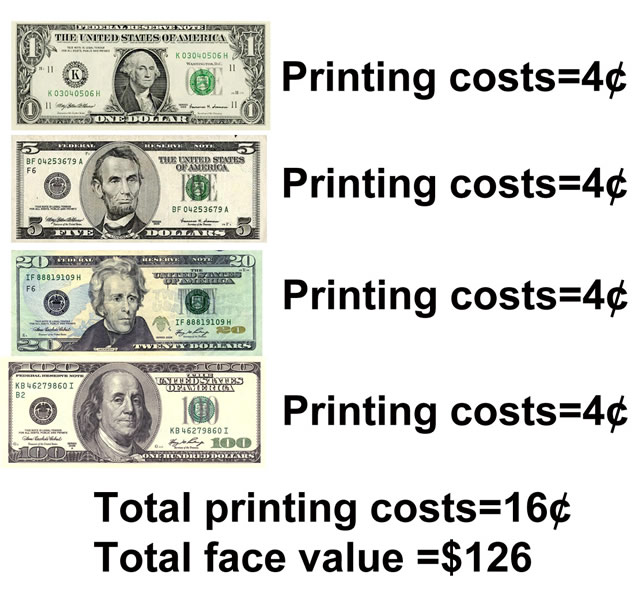So
what replaced the system that the founding fathers originally
intended? In 1913, the passage of the Federal Reserve Act granting the
Federal Reserve the legal authority to issue Federal Reserve Notes.
When President Wilson signed the bill, he declared it the “first of a
series of constructive acts to aid business”. In fact the only
business it aided was that of the private banks. The system was
designed from its inception to ensure that every dollar that came into
existence had to be borrowed from this private cartel of banks called
the Federal Reserve.
So what most people also do not know is that every
single dollar in circulation has to be borrowed by somebody. In other
words, the entire money supply is DEBT BASED and someone is paying
interest on that debt to the private bankers. In fact the total cost
for 2012 for just servicing the interest on the U.S. government debt
was an astounding $359 billion and $454 billion the year before. The
interest on our debt for those two years exceeds the entire stimulus
bill of 2009. Think of what we could do with that much money every
year: transportation, healthcare, modernizing the electric grid,
education, research, are just a few examples that quickly come to
mind.
It becomes very easy to see that the ability to collect
interest on the national debt involves huge sums of money being paid
out to those with the power to create our money and that these people
will do almost anything to make sure that things remain exactly as
they are. That is why they encourage their corporate controlled media
to ridicule the $trillion coin idea as something out of a fantasy
tale, or having the talking heads echoing that investors will be
spooked, and broadcasting that the world will think that the U.S. has
totally lost its marbles.
The question NOT being asked by the corporate media
shills is that if the U.S. government can issue its own interest free
money in the form of a $trillion coin, then why is it borrowing the
money at interest instead?
One can therefore think of the idea of issuing a
$trillion dollar coin as being equivalent to the idea of the
government printing its own money. The philosophy and result are
essentially the same.
Think about this: if you had the LEGAL right to print your own money would you:
1. print your own money to pay your bills?2. borrow money at interest from the private banks to pay your bills?
Of course any sane person would print their own money.
Yet here we have the unimaginable stupidity of a government with the
ability to print its own interest and debt free money. Instead chooses
to borrow that money at interest. Astoundingly, the corporate
controlled media is not asking why this practice continues.
It
actually gets even worse. It costs the government 4 cents to print a
bill of any denomination, for the paper, labor, ink equipment
maintenance etc. It does not matter whether the bill is $1, $5, $20,
or $100, the cost is the same. So if you were the one printing this
legal money, the last 4 bills mentioned would have cost you 16 cents to
print. Now can you imagine the totally absurd notion of you taking
these 4 bills to your banker, selling it to them for the cost of
printing (16 cents), and then borrowing it back at face value ($126)
with interest charges? This is the height of lunacy, and yet this is
exactly what our government does. The Treasury Dept prints the bills,
delivers them to the Federal Reserve branch offices, charges them for
the cost of printing, and then borrows this money back at face value
with interest. Ask yourself why the corporate controlled media is not
covering this story.

Henry Ford once wrote: “It is well enough
that people of the nation do not understand our banking and monetary
system, for if they did, I believe there would be a revolution before
tomorrow morning.”
The fatal flaw
in our monetary system is that every dollar has to be borrowed into
existence, then this money is extinguished once the loan is paid back.
So there is a balance here? Wrong! If you borrow $1000, you add $1000
to the money supply. When you pay the loan back, you extinguish the
$1000. The problem is where does the money to pay the interest come
from? There is not enough money in circulation to repay both the
principal and the interest. This lies at the very heart of our deficit problem.
Someone has to borrow money into circulation to cover the costs of
your interest payments. The amount of debt in our system must continue
to grow in order to service the interest payments on the original debt.
So the more the debt grows, the more interest payments needed, the
more that must be borrowed to pay that interest, the more debt grows.
The fact the U.S. is trillions in deficit is by design. In reality it
is impossible to repay this debt. When you hear those clueless people
talking about paying off the debt, it cannot be done. If we paid off
the entire debt, we would have no money in circulation.
Pretty
clever system these money masters have created for themselves,
keeping the nation and its people in perpetual debt slavery and
getting paid interest for something they created out of thin air,
something they never owned, something the Constitution never gave
them the right to do. The result of the unsustainability of our
current system is that ultimately the amount of debt overhang will
become so huge that the system will collapse in on itself. There are
many including myself who believe that we are approaching that end
point.
